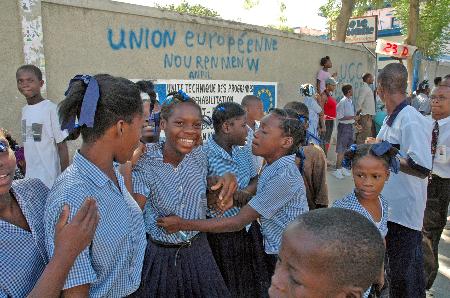
How can long-term development programmes survive the instant turmoil of a crisis situation? Alain Calosci, Technical Assistant at the European Union delegation to Haiti, tells us about his experience working on an education programme in the quake-struck Caribbean nation.
Even before last year's devastating tremor, Haiti had by far the worst performing education system in the Americas with almost 40 percent of the adult population unable to read and write, according to United Nations figures.
Today, with many of the country’s schools reduced to rubble and pupils and teachers existing in temporary tarpaulin shelters, supporting the country's education system is a more daunting challenge than ever.
Pre-quake education projects, like an EU-funded school improvement project, are still up and running but that’s due to a fortunate combination of luck and flexibility.
"The project has of course been slowed down in 2010 but it hasn't suffered much from last year’s events as none of Haiti's regions we are working with have been affected by the earthquake," Mr Calosci said. "The European Commission particularly played a key role by easing procedures that could have completely paralysed the programme's implementation."
Launched in 2003, the 42 million euro Programme for Improvement of Quality Education (PARQUE) in Haiti allows for building or rehabilitation of schools, the training of teachers and distribution of school kits across four Haitian regions.
So far, through the PARQUE, some 3,000 teachers have been trained and 450 schools rehabilitated or built. This has significantly improved the quality of education for more than 100,000 children.
"Thanks to PARQUE, we even managed to send to school the children of displaced families who had fled the devastated capital," Mr Calosci said.
However, full implementation of the programme continues to be hindered by the Haitian Government’s reluctance to bear the functioning and maintenance costs.
"The buildings as well as the motorbikes that pedagogical counsellors use to visit schools need maintenance. Generators need fuel to supply electricity to class rooms and IT facilities. What is going to happen when our programme stops at the end of the year?" said Mr Calosci.
According to Mr Calosci, "this is a glaring example of political constraints in a country where the share of the national budget allocated to education is insignificant. It explains the anarchic explosion of an unregulated private sector which provides uneven-quality schooling for more than 80% of Haiti’s pupils."
The question of governance is also a major obstacle. According to Alain Calosci, "too few inspectors visit schools and of the ones who do, too few take the trouble to take sanctions against absenteeism and the lack of results of teachers and of their management. Also, many appointments, especially at the management level, are made for political reasons rather than based on educational skills."
For Mr Calosci, there is a tangible deterioration at all levels of the Haitian education system. "I am not sure that the solutions proposed in the development plans - by national or international authorities - will be effective," he worries. "These solutions mainly aim at strengthening the options taken before the earthquake without examining in detail why the system wasn't working before."
Despite years of sustained and generous international aid, Haiti still struggles to escape the rampant poverty that bedevils the country. But after years living and working in this island nation, Mr Calosci remains optimistic and is convinced that Haiti has a wealth that is yet to be drawn upon.
"Of course, there are cultural, ecological and political reasons that hinder development. But, despite of all of this, I remain optimistic. As one of the candidates to the presidential elections said: ‘Haiti is too rich to be poor’", said Mr Calosci.
"More than ever, we need to help Haiti, or better said, we need to help Haiti in helping itself and include in this help a culture of results. Development projects are too often evaluated in terms of means and not enough in terms of results."
Log in with your EU Login account to post or comment on the platform.